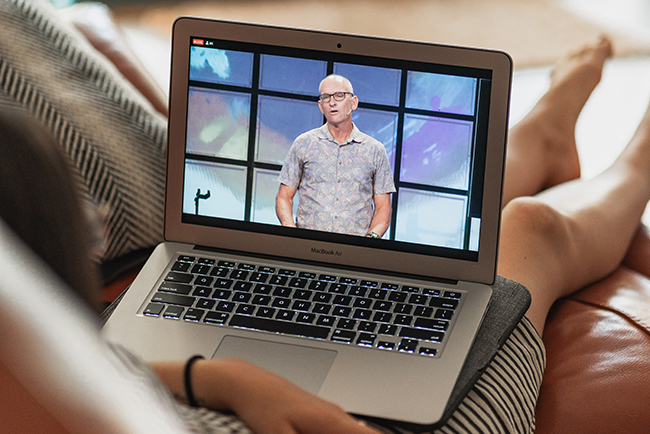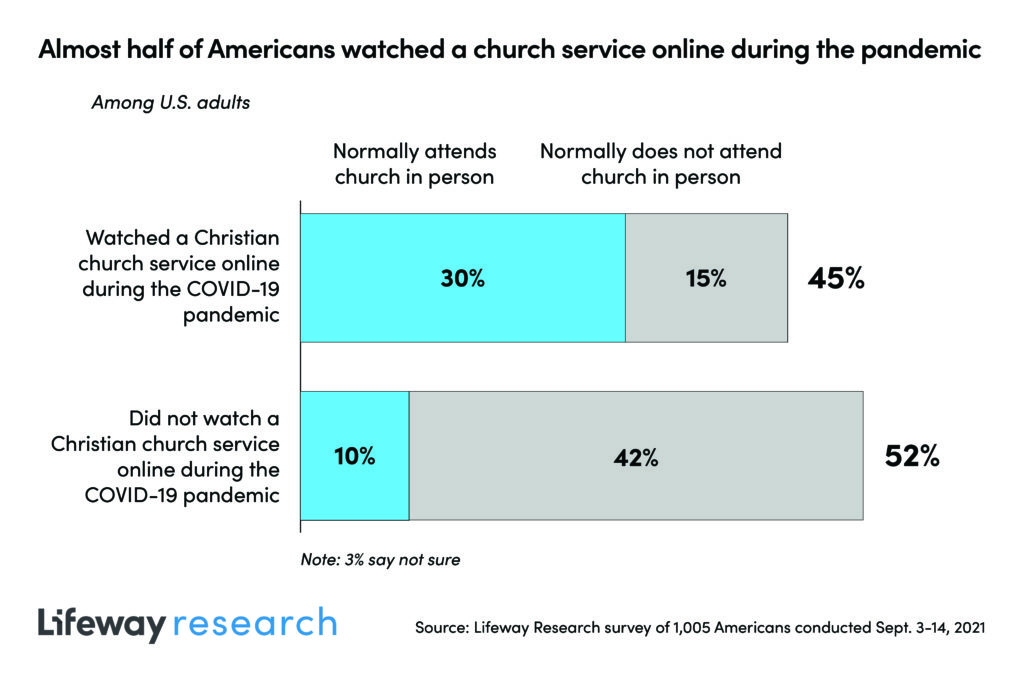
Almost half of Americans say they watched a church service online during the pandemic, including some who don’t normally physically attend.
By Aaron Earls
Prior to the COVID-19 pandemic, online worship services were a novel concept for many churches. In the almost two years since, however, churches have adapted and reached new people with the adoption of digital streaming.
According to a new study from Nashville-based Lifeway Research, 45% of Americans say they have watched a Christian church service online during the COVID-19 pandemic, including some who say they don’t normally physically attend. Around half (52%) say they have not watched a church service during the pandemic, most of whom say they don’t normally attend church in person either.

“The distance to one’s nearest church has changed almost overnight,” said Scott McConnell, executive director of Lifeway Research. “A form of communication that was not even used by most churches before the pandemic has now reached almost half of Americans.”
In a previous Lifeway Research study of Protestant pastors conducted prior to the spread of COVID-19, 41% said they didn’t regularly livestream any portion of their church service or post the sermon online later. At the time of the survey, only around 1 in 4 (27%) said they livestreamed either the entire service or just the sermon.
As the coronavirus began to spread and social distancing guidelines emerged, the vast majority of churches quickly provided digital options. By March 2020, Lifeway Research found 92% of Protestant pastors said they provided some type of video sermons or worship services online. That climbed to 97% in April 2020.
In a Lifeway Research study from early 2021, 85% of Protestant churchgoers said their congregation offered livestreamed worship services, and 76% said their church posted a video of the worship service to watch later. Additionally, 53% of churchgoers said they watched online worship services at their church more in 2020 than in 2019, while 21% said they watched more online services at a different church in 2020.
45% of Americans say they have watched a Christian church service online during the COVID-19 pandemic, including 30% who normally attend church in person and 15% who aren't regular in-person attendees. Click To TweetThroughout the pandemic, Lifeway Research found pastors reporting that new people who had previously not attended their church in the past attended or connected online. The latest study seems to bear that out.
When asked, “Have you watched a Christian church service online during the COVID pandemic?” 45% say they have, including 30% who normally attend church in person and 15% who normally do not attend in person.
“It’s not surprising to see churchgoers using online options to view a church service, but there are also those who have not been church attendees who have at least checked out a church service during the pandemic,” said McConnell.
Americans with evangelical beliefs are three times as likely as other Americans to say they watched church services online during the pandemic and normally attend church in person (64% to 20%).
Some of those most likely to say they watched church services online during the pandemic but don’t normally attend church in person include young adults ages 18-34 (18%) and African Americans (22%).
Church participation is in flux. This shift has created both challenges and opportunities for pastors and church leaders. — @smcconn Click To TweetChurches were still not able to reach most Americans with the expansion of digital offerings during the pandemic, however, as 52% say they have not watched services online during the pandemic. Most of those (42%) say they haven’t watched online and normally do not attend church in person. Another 1 in 10 Americans (10%) say they do normally attend church in person but have not watched a church service online during the pandemic.
“Church participation is in flux,” said McConnell. “Some who were regular, in-person churchgoers before COVID-19 only view online services today, others have never tuned in online despite the pandemic, and still others use both at different times. This shift has created both challenges and opportunities for pastors and church leaders.”

For more information, view the complete report.
Methodology:
The online survey of 1,005 Americans was conducted Sept. 3-14, 2021 using a national pre-recruited panel. Quotas and slight weights were used to balance gender, age, region, ethnicity, education and religion to more accurately reflect the population.
The completed sample is 1,005 surveys. The sample provides 95% confidence that the sampling error from the panel does not exceed plus or minus 3.3%. This margin of error accounts for the effect of weighting. Margins of error are higher in sub-groups.
Evangelical beliefs are defined using the National Association of Evangelicals and Lifeway Research Evangelical Beliefs Research Definition based on respondent beliefs. Respondents are asked their level of agreement with four separate statements using a four-point, forced choice scale (strongly agree, somewhat agree, somewhat disagree, strongly disagree). Those who strongly agree with all four statements are categorized as having evangelical beliefs:
• The Bible is the highest authority for what I believe.
• It is very important for me personally to encourage non-Christians to trust Jesus Christ as their Savior.
• Jesus Christ’s death on the cross is the only sacrifice that could remove the penalty of my sin.
• Only those who trust in Jesus Christ alone as their Savior receive God’s free gift of eternal salvation.








